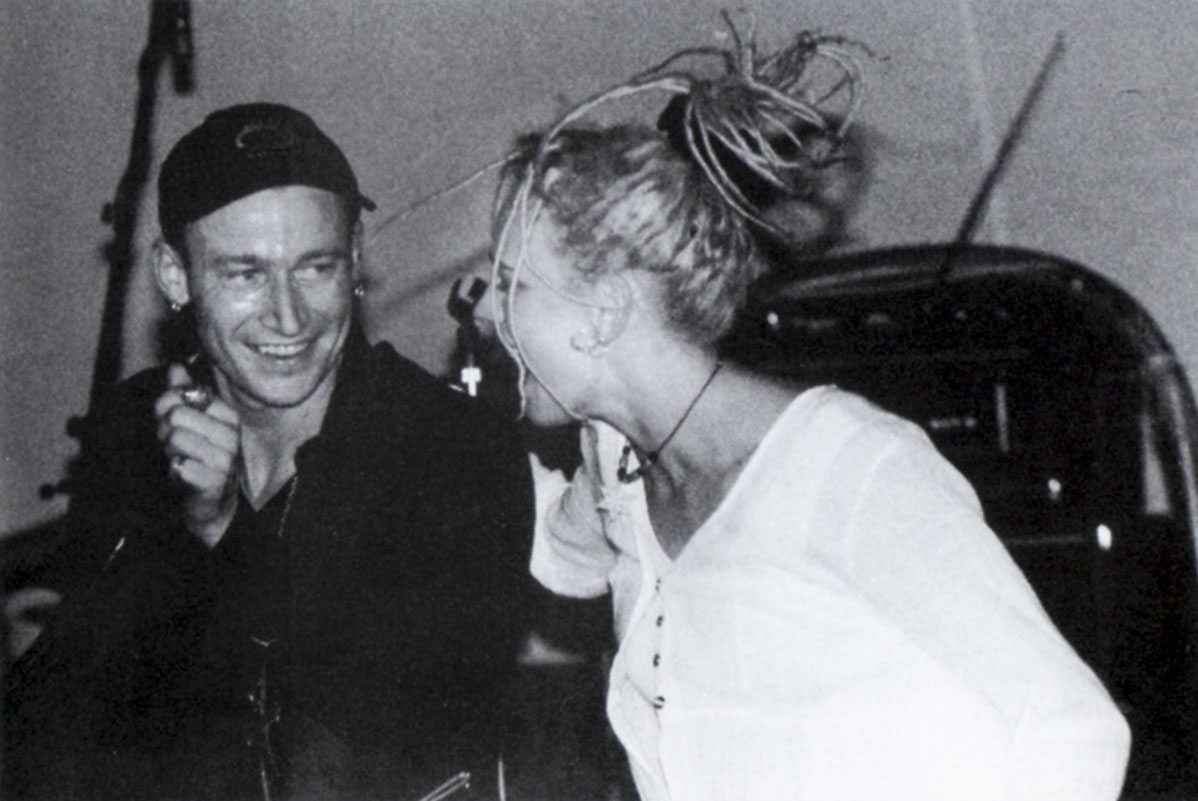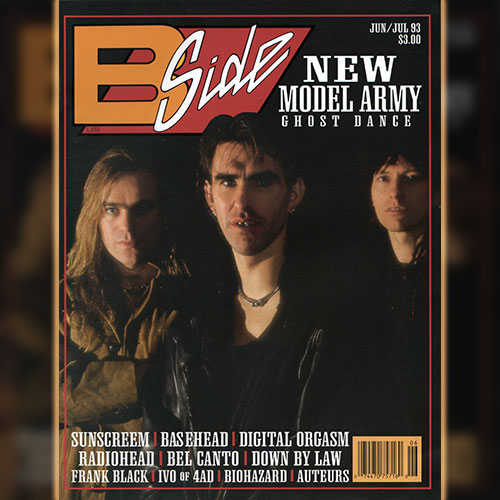Sunscreem: Move U More
by Arlene Colone / B-Side Jun-Jul 1993 / © B-Side
In the beginning, there was the Tunnel, 10:18, Red Zone, Roxy, Limelight, Palladium, Area and the World.
“Those are all the places where all those rave sounds started out first, aren’t they!” says Lucia, the blonde, beautiful, buxom lead singer for the hot new rave/pop act to emerge from the dehydration of all those famous ecstatic raves. Sunscreem is the name, and the game is that although they took their name from a keyboard sound, the sound they put on record is generated by a veritable live band, rather than one large, expensive, bizarre machine.
“We used to go out to raves and stuff,” says Lucia, “and they didn’t play anything like us—no guitars, no nothing. People were surprised when we turned up at raves—which were strictly keyboards and not very much vocals—and we had guitars and vocals.”
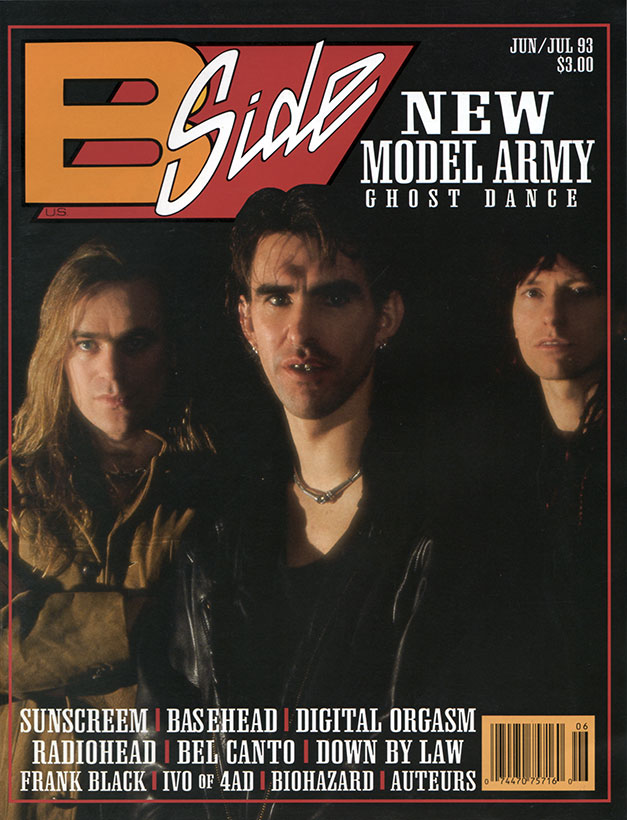
Guitars and vocals set to a hyperfast beat and dizzying melodies generated by machines and innovative deejays. A singer with the only real blonde dreadlocks in the business, a real bass player, a real guitarist, a manic drummer playing acoustic and electric at the same time, and a “techno-head” named Paul who dances more than anything else on stage. Of course, throw in a couple guest deejays and dancers and you have the collaboration that is storming dancefloors everywhere with the single Love U More and an album called O<sub>3</sub>.
Sunscreem is Rob Fricker on bass, Darren Woodford on guitar, Sean Wright on drums, Paul Carnell as techno, and Lucia Holm as “diva.”
The band seems to have popped out of nowhere during the height of the baggy rave scene of old when it hit American shores after some smart American deejays from the Bronx and Brooklyn took it over there and scored big with the unknowing public.
“There’s a lot of well-respected deejays that were in the rave scene in England who were from Brooklyn, like Frankie Bones,” says Rob as Paul describes, “Techno and all of the house scene did come over eventually from here and got huge in England.”
Rob: “And then the Germans and the Belgians got into it a bit and turned it into something a lot harder and lot faster.”
And then on the seventh day came Sunscreem, created some two and one half years ago somewhere near a recording studio.
“It was about two and a half years ago, yeah,” says Rob. “We met Paul thru another band, and we met Darren, the guitarist, who used to work in local studio as a guitar tech. We met a couple of dancers from going out clubbing and gigging, and I eventually said to them, ‘Don’t do that in front of the stage, do that on the stage!’”
Paul: “Two weeks later, there were dancing in front of 300 people at a club in Scotland!”
Rob: “Then we met Sean thru a friend at a rehearsal studio, and we’ve been together ever since.”
For obvious reasons, every band has a core of people, and in the case of Sunscreem it is deeply rooted in the studio wizardry of “techno-head” Paul Carrell [sic] (*1) and the fierce, on-stage personality and soaring voice of Lucia Holm (who didn’t give any fierce, diva-type stories about how she was discovered. The modest little thing).
Paul, a veritable 31 year old, professes to have an incredible background in electronic pop, owns his own studio, boasts that Depeche Mode comes from his hometown, and once had a techie type band in the late seventies called Newspeak. It died.
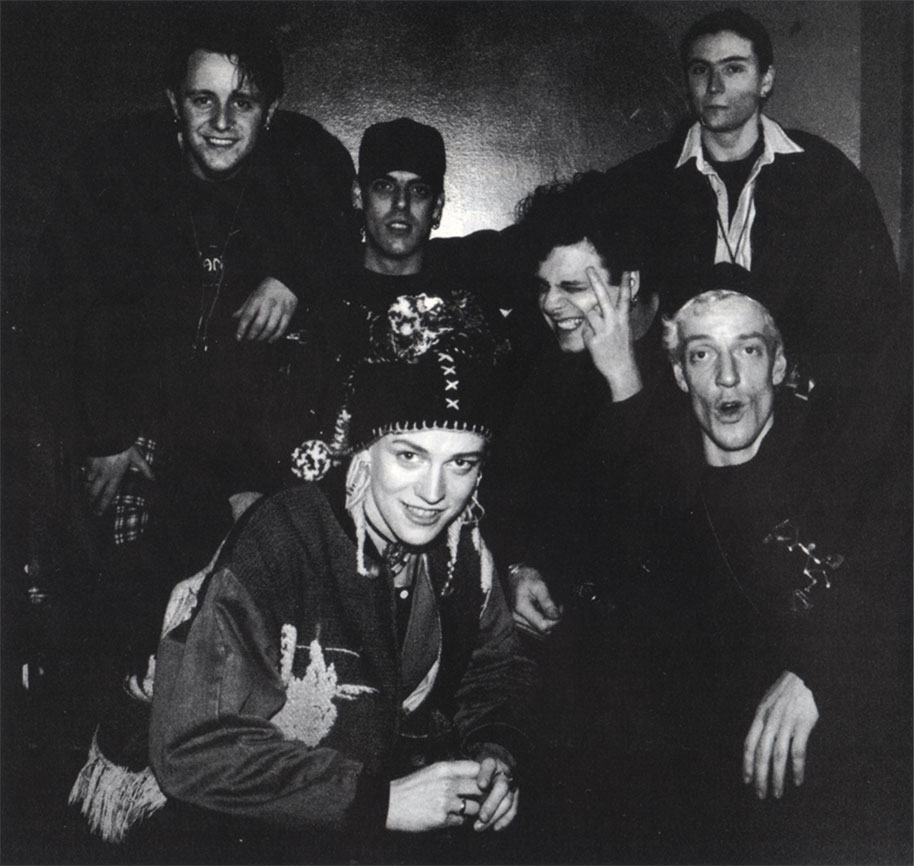
But we all know what newspeak is, don’t we? Something out of 1984, Future Shock and Brave New World, those futuristic type novels written during the former half of the century that are still baffling MIT students to this day. Indeed techno.
Lucia, singer extraordinaire, seemed to have an allotment next to Arthur Fowler’s somewhere in her future. She does admit to having handcrafted musical instruments when she was a kid and even worked on a farm during college. Musically, she did enjoy the cello because it reminded her of the shape of the human body. She took “20th Century Music 305” with Dr. Edward Phelps to further round out her musical intuition. She swears that some of this knowledge might creep its way onto the next LP if they’re not careful.
But first, the current album, O3, on Columbia Records, contains some elements of musical forms of our time that makes little use of the human being’s capacity for originality, intelligence, and intuition; rave and techno. It’s a just a deejay who puts old stuff together in new ways and drives a club full of dancers insane with driving beats and punching audio effects, and a lighting rig to blind them into submission. Or is it…
“It’s so varied over there musically right now,” says Lucia. “It started with the big hat, acid house thing, and it’s now broken into lots of different areas. There is progressive house, which is a bit slower than hardcore house, but just as synth. Hardcore is very fast and ragga, basically a reggae beat but twice as fast.”
Yeah, those reggae style beats and rappin’, real ragamuffin, and then with breakbeats.
Paul: “Which is like 60 beats per minute.”
Rob: “Then there’s the other side, the garage side, which is like 120 BPM, big and fast. The scene split into two at the time that came out.”
Paul describes, “That Madchester thing was a totally separate thing. In London, after the acid house thing, it did actually split and it started going into the rave thing and it started getting faster and faster and faster. The people who originally used to go out clubbing and were into acid house basically got fed up with hearing 160 BPM; I know I did, and consequently I stopped going out. But now it’s coming back around again, the music beginning to get really good and going back to where it comes from, which was the clubs.”
And out of the clubs and into the parks and into the tents with raves that would attract over 30,000 people at a time.
“A lot of bands like the Prodigy and people like that made hardcore a really big scene in England,” says Rob. “Bands like Altern 8 (RIP) were a lot more commercial but very fast and made some noise.”
“At that time it was getting popular, there were a lot of hardcore hits making it into the charts,” agrees Paul. “A year and a half ago, that would have been completely unheard of, really. There’s some fairly cliquey tracks on a Smartee, Smartee tune…”
“People take the theme tune from Sesame Street, put a breakbeat on it, and call it a house record,” scoffs Rob. Groan. He continues, “There were so many records like that, it’s ridiculous. People just got too sick of it and wanted something else. There’s this progressive thing happening in England, which is basically Detroit techno, but just a newer version of it. Well produced, good sounds, nice beats, and a lot of new deejays coming out.”
Paul: “It’s underplayed music but it’s got the power of the hardcore—that’s what I like about it. I used to really be into hardcore, but it just got too fast. I mean, I could dance fast, but not that fast!”
Lucia laughs, “Not for all night! There were people collapsing everywhere… Ha ha ha!”
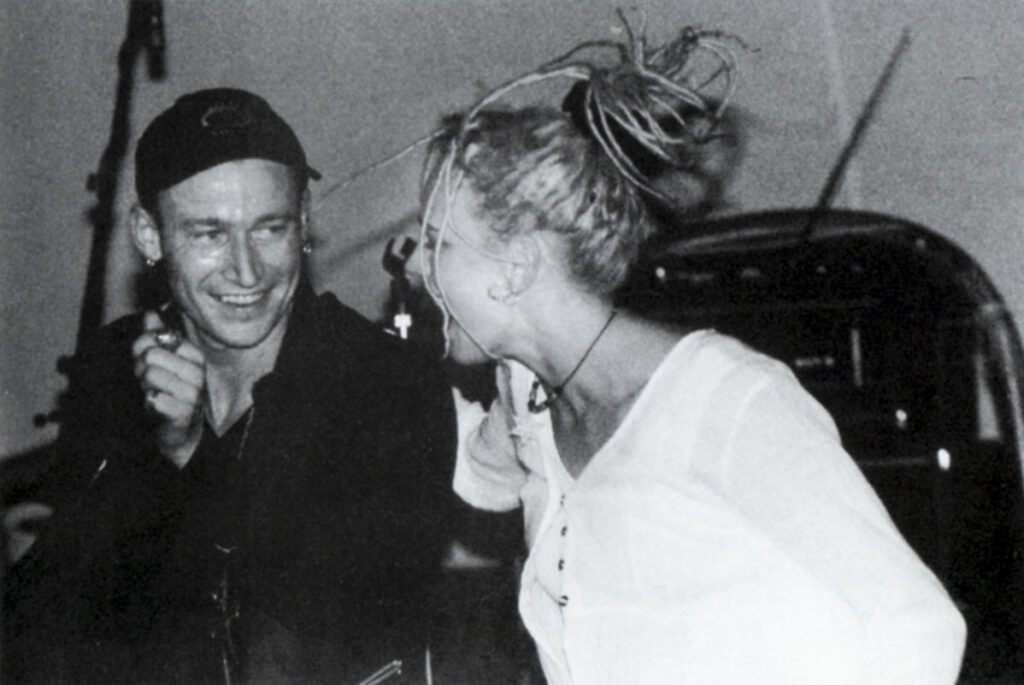
“People were just burning out,” agrees Paul. “I would go to a club, and they would be playing 160 BPM, and I’d be there for an hour and think, ‘it’s too much’. Nowadays, ya go out, and the music has the same feel of hardcore, it’s really really powerful, but it’s quite underplayed. It’s got a lot of tribal beats.”
Lucia describes, “Some people call it hard house.”
“Everyone’s got their little names for it,” notes Paul.
In our country it’s storming up the charts everytime ya turn around. Now with the advent of Sunscreem, it’s by way of the single Love U More, released this past fall.
“That was our third record,” explains Lucia, sans those giant homegirl doorknockers she endured during the natural, forest-lorn video for the single. “Oh God, they were so heavy!”
Rob quickly wants to get us back onto the chart matters. “Okay, okay, the single! The charts work differently in England. On the mainstream chart, it got to about number 23, but on the dance charts it was number one for three weeks, straight across the boards.”
Paul: “I personally think that the reason it has taken on so well over here is because it’s got quite a strong dance beat to it, but it has got a lot of rock influence. In America, a lot of people are into rock, and they’re very surprised to see a guitar guiding the dance music thing.”
Rob: “And the lyrics. It doesn’t have the usual dance lyrics to it, either.”
Um, yeah. That’s an understatement. “You can make the sun turn purple / you can make the sky [sic] turn turtle,” and “While fathers rape their daughters, but U KNOW YOU CAN NEVER MAKE ME LOVE U MORE” and a descending scale into oblivion. A stirring but lovely melody, bouncy beats and luscious Lucia. How does all this come together live on tour with Inspiral Carpets in the US and Jesus Jones in the UK?
“Um, well, when we’re onstage, we’re really energetic anyway, just as ourselves,” Lucia describes. “There’s also an awful lot of people, seven people onstage and it’s always energetic.”
“When we’re out there, we try to have as much fun as possible,” says Paul. I think the thing that I was most pleased with this band since I joined is that the whole thing onstage is to just have fun. We stayed away from this sort of…”
“Shoegazing, as we call it in England!” says Lucia.
“Yeah, ya know, standing stagnant onstage,” dismisses Rob. “Or, there’s the other extreme, where you have a band and two dancers and the dancers are up on platforms, the they’re wearing exactly the same thing, and they’re doing ‘1,2,3-jump! 1,2,3-jump!’ We’re dead against that.”
Lucia: “We don’t choreograph anything. Anything!”
Rob: “It’s a free for all up there.”
It looks like one, with the entire band groovin’. Not only does Lucia supply the luscious vocals, she also bangs away at keyboards on either side of the stage. Everyone looks so pleased to be performing that you’d have to be comatose not to respond: or be blinded by their brutal lights.
Lucia explains, “Well, we’re supporting on this tour so we really didn’t have any say in the lights.”
Rob: “In England, we take out our own deejays, our own productions, the whole lot. We can deck out the whole club if we want to. At the moment, we’re just about able to fit our own instruments on the stage.”
By the time the tour with Inspiral Carpets came to an end the band was no longer regarded as a mere opener. They were the star attraction. And who can complain about that, when you’re the only real band in a non-band environment, perhaps the first of its kind? No one could dance good in all those cramped clubs in the past, but that didn’t stop them. Just teeth and eyes and throbbing beat all nite until you puked. Just the way it should be.
Sunscreem got it going on and going good. God help them.
Gallery


